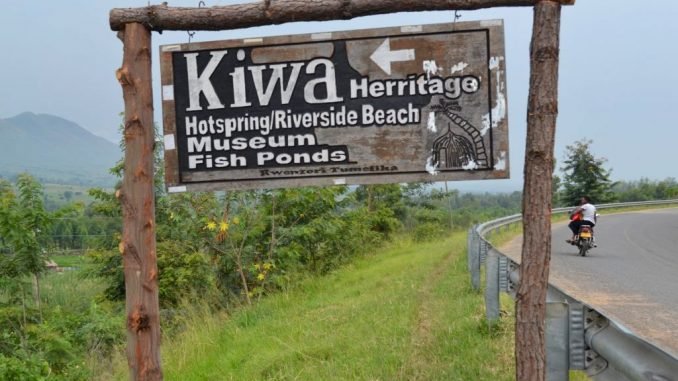
Kasese, Uganda | URN | Kasese is more known because of Queen Elizabeth National Park and Mt Rwenzori National Park — that attract thousands of tourists annually. However, Kiwa Heritage site is fast catching up as a destination for local and international tourists. Kiwa Heritage site, which is found along Kasese-Kilembe road in Kitonzi cell in Nyakabingo III ward of Bulembia Division, has become a popular spot in Kasese town.
Founded as a community based organisation in 2013, Kiwa Heritage provides several products including a swimming pool at the hot springs, volley ball on the banks of the stubborn river Nyamwamba, a cultural museum and local brew. Revelers disembark from their vehicles and motorcycles and park them along Kilembe road just a few meters from Margherita Hotel, Kasese’s oldest hotel.
As they proceed towards Kiwa, only a small path past a hilly area aligned with bamboo trees and rids projects a seemingly bushy area with nothing meaningfully going on. Revelers pay a paltry Shillings 2,000 to access the site at the reception build with reeds and roofed with spear grass.
However, behind the bushes is a beehive of activities as several people engage in all kinds of time-consuming activities, especially over the weekend. From the Kikonzo cultural dance of Ekikebi, guests are treated to natives aggressively dancing to their traditional folk songs, the melodious sounds from the flute and the beautiful sounds of drums accompanied with the xylophone.
Some of the guests swim in the hot springs, others play volley ball at the banks of Nyamwamba River with sand akin to that found on the beach while a few others view cultural items in the cultural museum.
Some of the people seat on stones enjoying their hard and soft drinks including the real Kasese waragi and Tonto fermented locally in the district as they chat away. Bread made out of bananas and cassava commonly referred to as Ebbwanga in the Lhukonzo language and Amatsayidongo prepared from fresh maize are served on order.
Read Also: Bungee Jumping: A thrill on River Nile
Sylvester Kule Walyuba, a team leader at Kiwa Heritage says the site was established in 2013 to interest the community in environmental conservation and preserve the positive cultural norms and values of the Bakonzo people.
Walyuba told this publication that they chose the hot springs to be the epicenter of these activities because of the fact that the Bakonzo hold geo-thermal features in high regard since the waters are said to possess medicinal value. He says the organisation has made strides in dissuading the community against environmental degradation especially along the Nyamwamba valley.
Indeed, the community seems to have appreciated Kiwa Heritage. According to statistics at the site, about sixty people visit Kiwa on each week day while more than 200 people stroll into the area any day of the weekend.
Walyuba says that much as River Nyamwamba had started being seen as a curse to the people after it wreaked havoc in the district in 2013, 2014 and 2015 having burst its banks and destroyed properties worth billions of shillings, youth who are now playing volley ball at the river bank are appreciating the river and embracing all efforts geared towards preserving it.
Read Also: Sport fishing boosts conservation in Murchison Falls
Kiwa has also become popular among non-natives of Kasese. The site is now a must reach for students on field study trips in Kasese who would like to learn about geothermal and the Bakonzo culture. In August alone, 650 students visited Kiwa Heritage.
Walyuba also told this publication that during that peak season of tourism in the district, the site hosts about 30 foreign guests per week. Joachim Kamalha, a resident of Kilembe in Bulembia Division of Kasese town says the site has become popular because unlike other happening places, the serenity in the area gives one an opportunity to enjoy nature.
Kamalha says the medicinal value of the water at Kiwa heritage is also another reason why it is sought after. According to Kamalha, the waters help in healing some ailments including obesity and wounds.
Troy Jim Kansiime is a resident of Kasese who has for more than a year been a regular figure at Kiwa Heritage. Kansiime is one person who claims to have experienced the healing powers of the hot springs.
She adds that she also used the site to learn about the culture of the Bakonzo but also uses the area to meditate and reflect about her life.
The Kasese District Principal Planner, Alex Masereka says Kiwa Heritage has become a key player in the tourism sector of the district since it holds guests a little longer than they would have stayed.
Masereka says that with the growing middle class in Kasese town, demand for decent hang-out places is also on the rise thus urging Kiwa Heritage to work towards improving their services and widening the site to host as many people as possible. He says the lower service rates at Kiwa even make it more attractive hence promoting local tourism among residents.
Read Also: Going Places: Pearl Gardens – Kalangala
The district planner also encouraged other private players to engage in related business so as to widen the scope on the tourism menu of the district. He revealed that two billion Shillings was allocated for the development of different hot springs in the district, Kiwa heritage inclusive, under the Agro-Industrialisation for Local Economic Development (AgriLED) initiative.
Walyuba says he has already sunk more than Shillings 150 million in putting in place the infrastructure at Kiwa. He adds that if they get funds, he will expand his buffer zone to occupy all the three acres of land on, which Kiwa Heritage seats. Currently only one acre of land is being utilized.
He told this publication that they will also introduce more activities including sport fishing. Kiwa already has a fish pond that is home tilapia fish. Walyuba hopes they can establish another fish pond.



